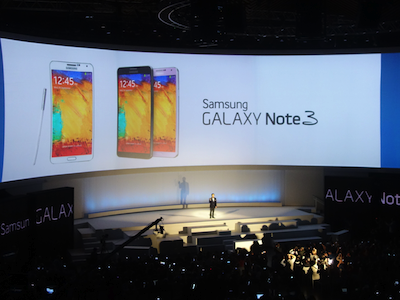Samsung Explains Galaxy Note 3 Benchmark Tweaking
Samsung explains why the Galaxy Note 3 kicks in to turbo when benchmarks are run.
Samsung is once again defending itself against accusations of inflating benchmarks. Earlier this week, Ars Technica showed evidence that the Galaxy Note 3 goes into a benchmark boost mode when specific benchmark apps are run. Essentially the site duplicated a popular benchmark, renamed it, and showed that the phone maxed out all four cores at 2.3 GHz when running the popular solution, but not when the renamed-yet-identical version was running.
"The Galaxy Note 3 maximizes its CPU/GPU frequencies when running features that demand substantial performance," Samsung said in a statement to CNET UK. "This was not an attempt to exaggerate particular benchmarking results. We remain committed to providing our customers with the best possible user experience."
Ars Technica said the benchmark mode is triggered by a file named "DVFSHelper.java" that contains a hard-coded list of every package that is affected by the CPU boosting. This DVFSHelper function is used exclusively for benchmarks, covering all the popular benchmarking apps including Geekbench, Quadrant, Antutu, Linpack, GFXBench and several Samsung benchmarks.
The site grew suspicious when it noticed that the 2.3 GHz Snapdragon 800 chip in the Galaxy Note 3 was outperforming the same chip in a similarly designed LG G2. The artificial boosting was discovered in the U.S. version of the Note 3, giving the device a 20 percent boost over its natural score, which is similar to the LG G2 phone, if not slightly better.
Earlier this year, Samsung was caught inflating the benchmarks of its Galaxy S4, turning the phone's GPU up to 533 MHz when specific benchmarks were running. Samsung said that under ordinary conditions, the Galaxy S4 is designed to allow a maximum GPU frequency of 533 MHz. However, the maximum GPU frequency is lowered to 480 MHz for certain gaming apps that may cause an overload, when they are used for a prolonged period of time in full-screen mode.
Just days ago, it was revealed that it's not just Samsung artificially inflating benchmarks, but even Asus, HTC and LG. Even more, nearly all Android device makers have been found to be participants in benchmark inflation over the past several years. The only companies not appearing to tamper with benchmarks is Apple, Motorola, Nvidia Shield, and Google with its Nexus devices.
In AnandTech's tests, smartphones affected by benchmark tampering included the Asus Padfone Infinity, the HTC One, the HTC One Mini, the LG G2, the Samsung Galaxy S 4, the Samsung Galaxy Note 3, and the Samsung Galaxy Tab 3 10.1 and 2014 Edition tablets.
Get Tom's Hardware's best news and in-depth reviews, straight to your inbox.

Kevin Parrish has over a decade of experience as a writer, editor, and product tester. His work focused on computer hardware, networking equipment, smartphones, tablets, gaming consoles, and other internet-connected devices. His work has appeared in Tom's Hardware, Tom's Guide, Maximum PC, Digital Trends, Android Authority, How-To Geek, Lifewire, and others.
